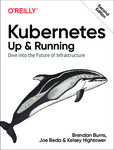Learn how to use Kubernetes to enhance the agility, reliability, and efficiency of your distributed systems. Get the practical Kubernetes skills you need in the Kubernetes: Up and Running, Second Edition e-book from O’Reilly.
You’ll learn how to:
- Develop and deploy real-world applications using Kubernetes, Pods, services, Ingress, and ReplicaSets with practical examples.
- Create and run a simple cluster.
- Integrate storage into containerized microservices.
- Use specialized objects like DaemonSet jobs, ConfigMaps, and secrets.
Learn how to use tools and APIs to automate scalable distributed systems for online services, machine learning applications, or even a cluster of Raspberry Pi computers
Rated 5 stars on Amazon AU. Current Kindle eBook's price is $85.19

Thanks for the find OP.